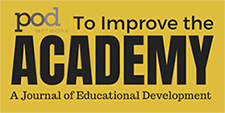Professional and Organizational Development Network in Higher Education

To Improve the Academy: A Journal of Educational Development
Date of this Version
2004
Document Type
Article
Citation
To Improve the Academy: A Journal of Educational Development (20) 2; doi: http://dx.doi.org/10.3998/tia.17063888.0022.018http://dx.doi.org/10.3998/tia.17063888.0022.018
Abstract
Evaluating student performance in learning teams is challenging. This chapter reviews the student learning team and peer evaluation literature. The authors share the results of their experience using four rubrics for peer evaluation in student learning teams. Student learning teams involve forming students into teams for the semester to enhance their active learning. A portion of the course grade is dedicated to team quizzes, activities, and projects. The authors conclude that peer evaluation data should be used both formatively and summatively to enhance team cohesion and accountability and provide their preferred rubric for the peer evaluation process. Usage of forced differentiation in peer evaluation is discussed. A mathematical formula for calculating the impact of peer evaluations in learning teams on course or team project grades is presented.
Included in
Curriculum and Instruction Commons, Higher Education Commons, Higher Education Administration Commons, Higher Education and Teaching Commons, Other Education Commons


Comments
License: CC BY-NC-ND